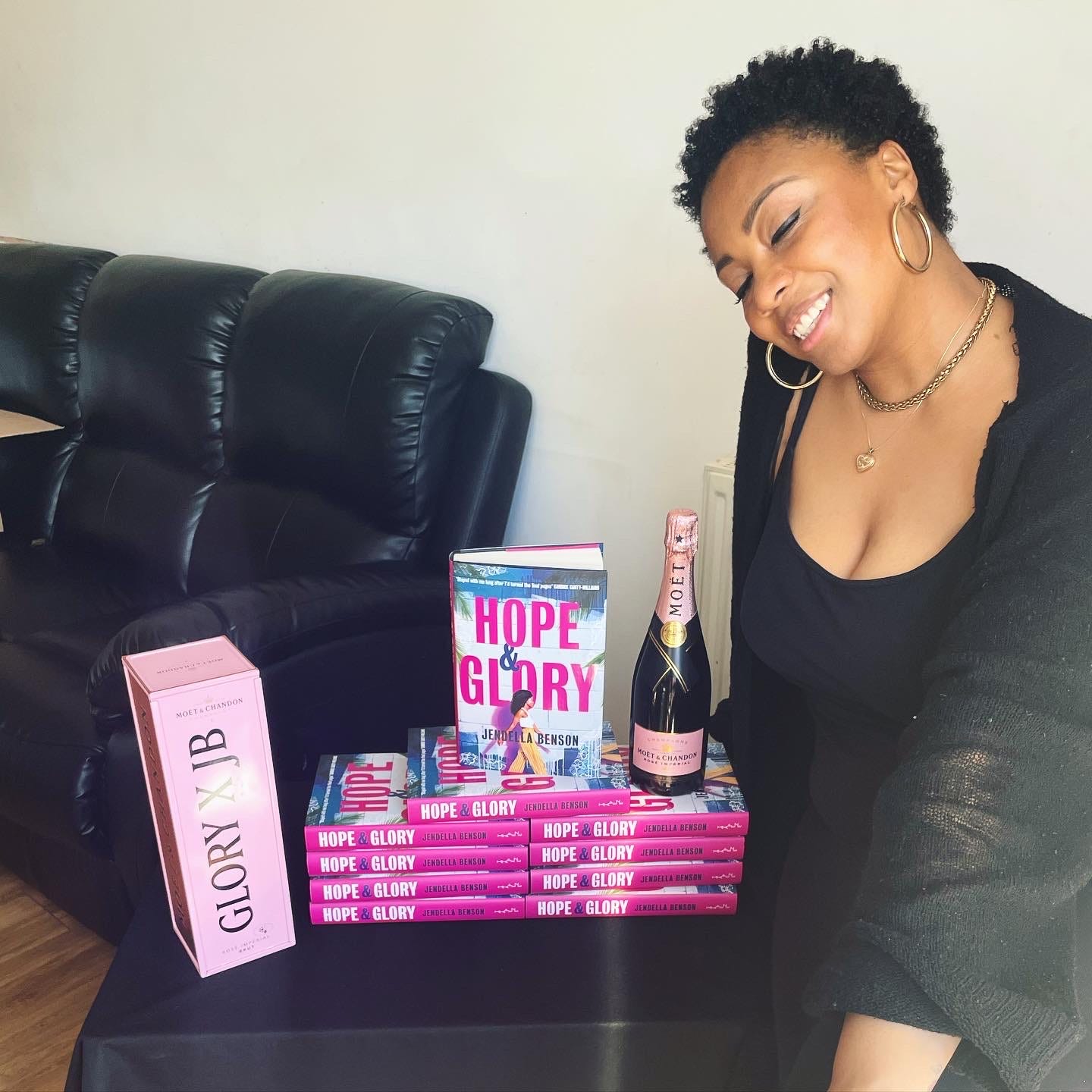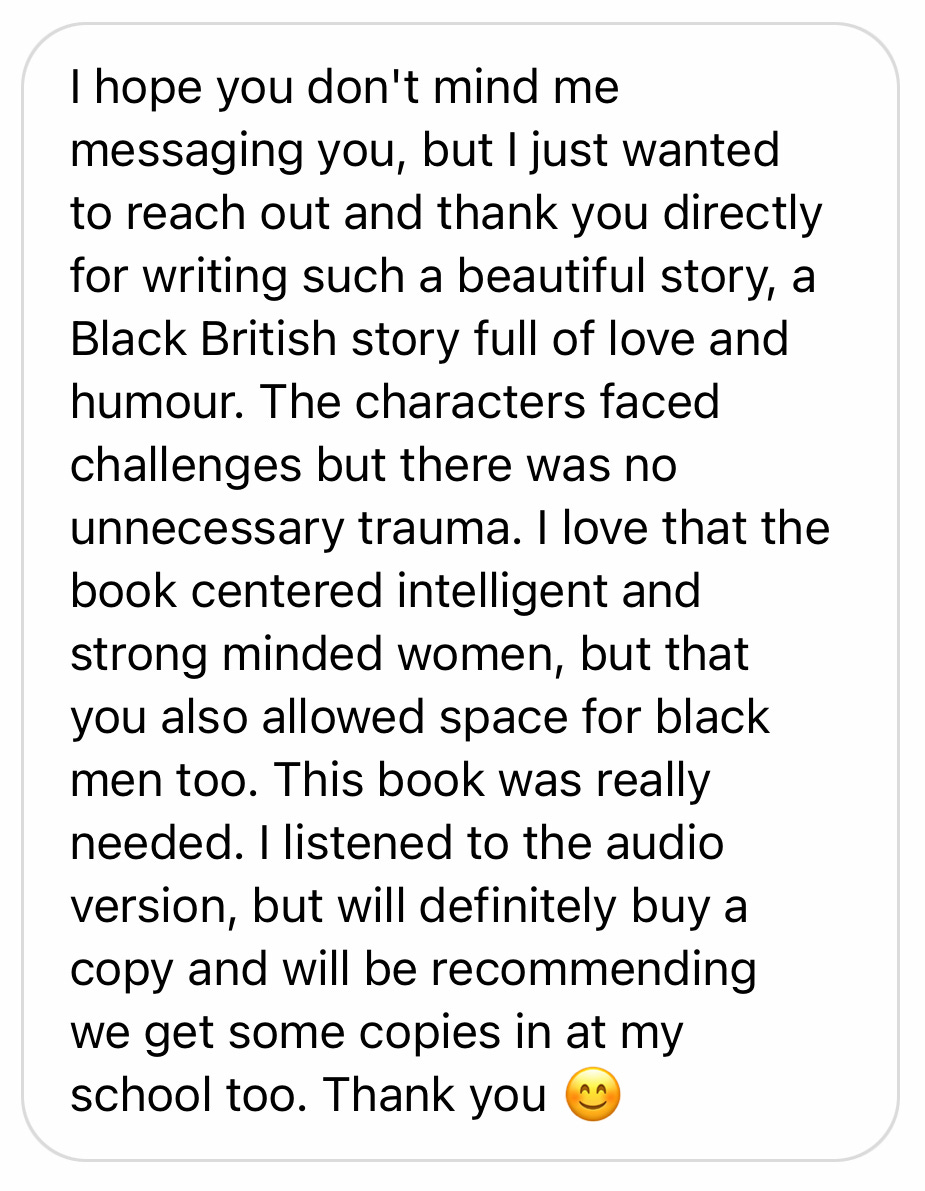Why Did You Write This Book Again?
Wrestling with my ego and intentions, two months after publication.
(So, like, I never officially announced it in this newsletter, but I wrote a book and it was published in the UK and the US. Find out more about it here!)
A week or so after your book is officially published, your editor will let you know the first week’s sales figures. That was the moment I knew I would not be able to claim the title of ‘Instant Sunday Times Bestseller’.
And it shouldn’t have mattered, because in the weeks leading up to publication I had said some version of “being a bestseller would be nice, but really I just want the people I wrote the book for to read it – that’s the most important thing to me.” Each time I said it, I sincerely meant it, and maybe once upon a time I wouldn’t have even have considered the notion of being a bestselling author at all. But in recent years, having witnessed amazing Black British Women authors and their amazing Books land on bestseller lists both home and abroad, a wild seed of possibility was planted.
While my general demeanour may not suggest it, the reality is I suffer from an acute case of Main Character Syndrome. Maybe it’s the Yorùbá in me, perhaps it’s being the oldest sibling or the fact that having always done well academically, I’m used to spotlights and validation. Whatever the root cause, the fact remains. So once I’ve finished (properly) celebrating my peers, the next question I ask is “Why them and not me?” Not in a “What was so good about their books anyway? 😒” vibe, but more, [Nigerian accent] “See your agemates?! If they can succeed on that level, why can’t you?! Do they have two heads?!”
If you’re thinking that it isn’t helpful to compare the perceived success of books that are released at different times and vary wildly in genre and form – I agree! Because even though I have some wild notions about what I could have changed about Hope & Glory to cater more to the tastes of the British book-buying public, who knows if that Frankenstein of a book would have even been good enough to get a deal? Who knows if I would have even been able to finish writing a story cynically crafted to exploit the expectations of (assumed) middle class white women? (Probably not tbh.) It’s all unhelpful speculation, and I should harness this imaginative energy to write the book I’m legally contracted to write!
Now this is also the part where I could say that despite its iconic, canonical status now, The Bluest Eye by Toni Morrison was not a commercial success when it was first released. In fact, some readers – black and white – really didn’t like it! I can probably name other authors whose debut novel wasn’t a runaway train that put their names in everyone’s mouths. But while these anecdotes are definitely encouraging, I genuinely don’t think comparison at any level serves me well in the long run. I just need to do the work that I need to do, enjoy my life and love on my peoples. Or “face your front” as Nigerian parents have been fond of saying.
I saw a fellow author at an event a while back, and we were talking about next projects and moving into other realms and media. “There’s no money in books,” they said candidly and I laughed wryly and agreed. The reality is that the publishing model relies on their smaller roster of blockbuster books to bankroll the rest of us. “Even though there’s no money,” I repeated to someone else, a friend I was catching up with over lunch, “It’s a compulsion! I would be writing anyway, book deal or not, so it’s not like I’m gonna just stop because at the moment it feels like an anti-climax, is it?!” This friend, another writer, slogging through a draft of a book that they wish they were done with but are still compelled to continue working on, nodded knowingly.
In a conversation with Bolu Babalola celebrating the launch of their romance novel, You Made A Fool Of Death With Your Beauty, Akwaeke Emezi mentioned that they read the feedback from advance readers ahead of publication so that they know how to position and talk about their book as they do press. It makes sense; if there are common things that crop up in Goodreads reviews, then you can anticipate the misreadings of your book and know the talking points that you want to focus on in interviews so that the message you want to get across sticks. As it happened, a few days before publication of my debut, I read through all the two- and one-star reviews on Goodreads for Hope & Glory. I was curious: what would be the thing that makes someone not like my book? It’s the same thing I do with books by other authors that I love, because how can you possibly hate The Color Purple?! And yet… nearly 8,000 Goodreaders do.
I won’t regale you with the specifics but long story short, I got in my feelings – surprise, surprise!! – and clicked on the profile of the low-starrers to see what books they did like, almost to confirm to myself that they had no taste anyway. But after trying to parse a disparate list of books that I had never heard of – so had no way of knowing if they were actually ‘good’ – I realised how stupid I was being and reminded myself that THIS IS WHY I SHOULD NEVER READ MY REVIEWS. In a debut author group I had joked in all seriousness that “if someone doesn’t like my book, then that’s fine because it wasn’t for them anyway” and that’s what I remembered as I read a review from a woman from a random Midwestern state in America who clearly must not have finished reading Hope & Glory because if they did they would have known that their comments didn’t even make sense!!!1!! (OK, calm down, Jen. Take a deep breath in…) “Of course someone like them [like who?! so many assumptions!!] wouldn’t like it!” I mumbled internally, but it was helpful to remember that all the advance feedback I’d had so far from Black British women like me had been wonderful.
But also, the good thing about social media is that I occasionally get messages from readers who are not like me in the slightest…
…and isn’t that a whole other level of magic?! That you can pull a story from your brain, immortalise it on paper and a piece of you will connect with a complete stranger who you will probably never meet? That, as long as my book remains in print, I could be connecting on an emotional level with people like-and-unlike me long after I’m dead? While my ego is thirsty for accolades and wider validation, my heart soars every time I read back a personal message from someone who liked my book so much they looked me up on Instagram to tell me. 🥲
In the immortal words of Khae Not Bae: “The girls that get it, get it…”
(P.S. Also, like, two months after publication is a ridiculously short amount of time to be feeling a way about a book it took you years to write. TWO MONTHS?! Has the book even got its first tooth yet?! Relax, man! Flippin’ hell!)



